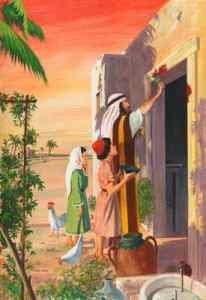Thursday: Josiah’s Reforms
Despite the forewarning of doom, Josiah was still determined to do what was right in the eyes of the Lord.
Maybe disaster couldn’t be averted, but in announcing the retributive judgments of Heaven, the Lord had not withdrawn opportunity for repentance and reformation; and Josiah, discerning in this a willingness on the part of God to temper His judgments with mercy, determined to do all in his power to bring about decided reforms.
-Ellen G. White, Prophets and Kings, p. 400.
Read 2 Kings 23:1-28. What was the essence of the reform that the faithful king sought to bring to his corrupted nation? What do these acts tell us about just how bad things had become in the chosen nation?
Josiah gathered all the people in Jerusalem in order to renew their covenant with God. The recently found Book of the Law was read, and then they made the vow to follow the God of Israel.
The king did not execute this work by himself, but asked those who had spiritual responsibilities to do what was needed. As an example, throughout the centuries, different objects-statues and symbols that popularized foreign worship in Israel-had been gathered into the temple. Sometimes they had been part of the conditions of peace, imposed upon the nation; sometimes kings had exhibited them in order to signify their pacification, a sign of surrender. Whatever the reasons, they did not belong there, and Josiah ordered them removed and destroyed.
Also, the Passover celebration during Josiah’s reform did not take place only within the family households, as had been the custom before, but now the whole nation celebrated it together. Its symbolic message for the people was that they had left the old era behind them, and that they had now entered a new time in which they vowed to serve the true God, who led them out of Egypt, who provided a home for the tribes as He had promised, and who was with them in their everyday lives.
The significance in celebrating the national Passover was to start something new because (ideally, anyway) all the old things had come to an end. What should the symbolism of the Passover mean to us now, as Seventh-day Adventists?(See 1 Cor. 5:7.)


This is marvelous to have it every day it gives me joy above all happiness on earth, this study guide, very very good indeed. Tanks
How the king behaved is something that presidents of today cannot even do. Even some other people in our own churches can not. We must be humble and be concerned with other people’s sins by doing that we will maintain our relation with God and even friends
I see the exchange of old for new in baptism. Also, I’m reminded of the OT blood of the lamb on the doorposts, exchanged for the broken body and spilled blood of the Lamb of God, Jesus.
King Josiah efforts to “reform” Israel religion beliefs was a successful only in “actions” of returning to serve the true God of that brought them out of Egypt… but their hearts were “not converted”. It is like they were just “going through their divine services routine” without true feeling of repentence and love for God! We know it because after the reign of king Josiah, the people went “back” to their old ways of sin…this time worse than before. What does this tell us? It’s a good lesson for church leaders… We are living in “troublous times” and we should be “ernestly praying” for God to help our church leaders Not to fall away from His ways!
Can someone please comment and answer this question asked in today’s lesson?
What should the symbolism of the Passover mean to us now, as Seventh-day Adventists?(See 1 Cor. 5:7.)